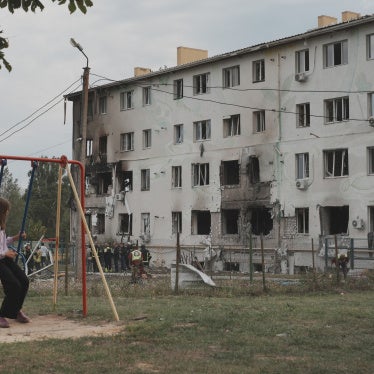Human Rights Watch welcomed the release of a Serbian journalist, but also called for the release of hundreds of Kosovo Albanians currently in Serbian jails.
Miroslav Filipovic, a freelance journalist from the Serbian town of Kraljevo, was sentenced in July 2000 to seven years in prison for articles written for the Internet site of the Institute for War and Peace Reporting (IWPR), an organization based in London. The articles alleged that Yugoslav Army servicemen committed war crimes against Kosovo Albanians during the 1999 NATO war and that the army's presence provoked tensions in Sandzak, a region in Serbia inhabited mostly by Muslims.
The Supreme Military Court in Belgrade annulled the guilty verdict against Filipovic today on procedural grounds, and sent the case back to the court for a new trial. Meanwhile, Filipovic was released on his own recognizance. It is widely believed that the Yugoslav Army leadership, which met with the new Yugoslav President Vojislav Kostunica on October 5, accepted Mr. Kostunica and that the release of Filipovic reflects the political agenda of the new president.
"Releasing Filipovic is a good step, but Kostunica can and should do much more," said Rachel Denber, Acting Executive Director of Human Rights Watch's Europe and Central Asia Division. "Hundreds of Kosovo Albanians are serving unjust sentences in Serbia. Releasing them would show conclusively that the new government is fundamentally different from that of Slobodan Milosevic. It would show a dedication to justice and ethnic tolerance."
Serbian human rights groups estimate that 850 Kosovo Albanians who were arrested during last year's NATO war are currently serving prison sentences in Serbia. Most sentences resulted from unfair trials lacking evidence against the accused.
President Kostunica's first opportunity to set a pattern for the release of Kosovo Albanian political prisoners will come on Thursday, when a Serbian court will re-hear the case of Flora Brovina, chair of the League of Albanian Women in Kosovo. Brovina, a poet and physician, was sentenced in November 1999 by a district court in Nis to twelve years in prison on charges of conspiracy to commit "hostile activity" and terrorism. The prosecution alleged that Brovina was ferrying supplies to the KLA, and based the case against her solely on a receipt for knitting wool, medicines, and medical supplies, and a photograph showing Dr. Brovina with an Albanian fighter.
On May 17, 2000, the Supreme Court of Serbia struck down Brovina's sentence on procedural grounds and returned the case for a new trial. But it also ruled to keep Brovina in custody pending the re-trial.
Of 850 Kosovo Albanian political prisoners, about 650 had their sentences confirmed by the Serbian Supreme Court or the Yugoslav military courts. Only a presidential pardon now can expedite their release. Article 96 (8) of the Yugoslav constitution vests the president with this power. The remaining 200 Albanian prisoners are awaiting appeals decisions by the supreme courts, as was the case with journalist Miroslav Filipovic.
"We are aware that the new government in Serbia is only being shaped at this stage, and that it will need some time to address all the cases from the past two years in which individuals were sentenced on political grounds," Denber said. "But Kostunica should not wait too long."
Denber said that Mr. Kostunica's position so far rejecting the transfer of indictees to the International Criminal Tribunal for the Former Yugoslavia in the Hague threw into question the adherence of the post-Milosevic leadership to international principles that underpin justice and the rule of law. "Any reluctance to release political prisoners regardless of their ethnicity would be another warning signal," she said.







